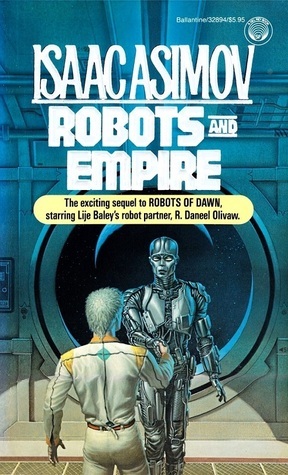- The Good: Unique combination of the mystery and scifi genres; Exploration of the Three Laws of Robotics
- The Bad: Slow second act and repetitive exposition
- The Literary: Highly effective worldbuilding that unites a galactic series into a scifi universe
Two centuries after the death of Earthman Elijah Baley, Earthers are at last spreading throughout the galaxy and colonizing new planets and are now casually referred to as Settlers. Baley’s former love interest Gladia Delmarre lives alongside two robots, humanoid R. Daneel Olivaw and metallic R. Giskard Reventlov. Together they all play a role in uncovering a plot by the Auroran politician Keldon Amadiro to destroy Earth.
I’ll take a step back and summarize. The earlier trilogy of Robot novels follows Elijah Baley, a policeman living in the underground cities of Earth. Some humans had migrated to space centuries ago, and these “Spacers” now live sanitized luxurious multi-century lives and generally look down on the overpopulated and agoraphobic Earthers. But all humans live in blended human-robot societies at different ratios.
This novel was written many years after the previous installments, in an attempt to unite the robot, empire, and foundation series into one greater universe. Despite this novel breaking the murder-mystery tradition of its predecessors, I’m surprised how well this novel matches in tone.
Now in Robots and Empire, as Earthers begin to colonize other planets, political tensions arise, and Spacers must face their own decline in power. The trigger for all of this is everyman Elijah Baley, who thwarted Keldon Amadiro’s plan to keep Earthers on Earth, and now centuries later, well after Baley’s death, Amadiro is still seething.
Gladia’s own extended life has been normal, including marriage, children, and divorce. One day, an Auroran roboticist arrives at Gladia’s house. Though Auroran’s don’t place value of blood lines, he’s a descendent of Gladia’s and wants to know if there is any chance he’s also a descendent of Baley. It’s a very personal question and Gladia asks him to leave.
Shortly thereafter, a seventh-generation descendant of Baley’s, Daneel Giskard (‘D.G.’) Baley, a short-lived Earthman from Baleyworld, arrives and asks for Gladia’s help on a mission to uncover what’s happened to Settler ships that landed on Solaria and disappeared. Scans of Solaria indicate all Solarians vacated the planet (although it’s not clear why or to where), but still populated by robots. Gladia is Solarian by birth but has lived on Aurora for twenty decades, and she reluctantly agrees to help.
At the same time, robots R. Daneel Olivaw and R. Giskard Reventlov understand the threat from Amidiro, and spend hours discussing what his plans are, reformulating with each additional clue. Daneel and Giskard are partners and friends in their own right, and I love that in this book many of the incisive conversations are between these two. They puzzle out human behavior, mysteries of the Solarians, the Settler/Spacer relationship, and more. Interestingly, as they circle closer to the truth, their actions are limited by the First Law of Robotics, “A robot may not injure a human being, or through inaction, allow a human being to come to harm.”
I love that Asimov has set up these three Laws of Robotics from the very beginning and uses these novels an exploration of what these laws mean under a wide variety of circumstances and mysteries. But here something new happens, and Daneel, the most sophisticated robot in existence, manages to add to his own programming, formulating a new Zeroeth Law of Robotics. I won’t say more, but this plot turn is a lovely example of worldbuilding that emerges from its own self-defined constraints and opens up an entirely new world of implications to explore.
You might think that it’s strange to read a book in a series whose protagonist is long dead, but it’s not, for two reasons. First, Baley is present in the minds of all the other characters, and his legacy is strong. Second, by the end of this novel, I realize that Baley never was the intended hero; it was Daneel all along.
I’ll conclude with the same praise as the previous Robot novels, which is that these books are so easy and fun to read. Asimov’s writing is effortless, and this series would be a fantastic introduction to the scifi genre.
